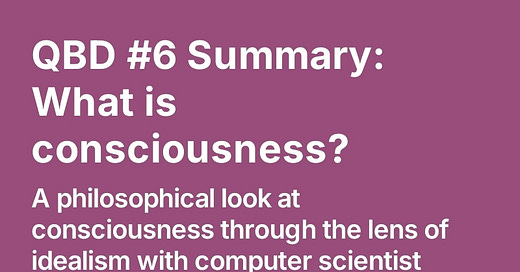QBD #7 Summary: What is consciousness?
A philosophical look at consciousness through the lens of idealism with computer scientist and philosopher Bernardo Kastrup.
This Quick but Deep goes into something we all experience—consciousness.
Philosophers and scientists often use the word ‘consciousness’ differently, and it can be confusing to get everyone on the same page. Bernardo and I discuss how we might clarify this confusion.
This is a research conversation, but one that might pertain to your own experience in life. Think about when you were a baby, for example. Most of us do not remember being conscious; we were conscious, but we did not know we were conscious yet, at least not in the way we do now. So when scientists write about children ‘becoming conscious’ for the first time at the age of five months, what they might mean is that children begin to show signs they are ‘conscious of themselves as conscious’ around that age.
This reflection develops quickly over the first five to six years of life. The more we experience, the more we learn to reflect on ourselves as living subjects, and over time, we also learn how to communicate about the continuity of this experience. We notice this continuity of consciousness as our life.
As babies, we may not think of ourselves as conscious or notice this continuity as such, but others (like our parents or caretakers) are conscious of our experience for us and their awareness of us helps us develop our reflexivity.
This still happens to us often and sometimes in ways we can catch and notice. Maybe you have had the experience of driving or cycling or walking and suddenly realizing that you have been ‘lost in thought’ and cannot remember the last part of the journey. During this time, we are not conscious of experiencing our own consciousness in its continuity, but we are still continuously conscious. We were not aware of our conscious continuity as it was happening, but we were still very much alive and conscious.
Why does this nuance matter?
Because at times, we discuss other forms of life, and the consciousness of one another, with the same confusion. This confusion can quickly create situations where we are using the same words but meaning very different things. We may be fighting over a subject we actually agree about, unaware that we are using the same words to mean different things.
Bernardo and I discuss how doing the hard work of thinking this through can open up our capacities for experience and connection. Though we start with
Keep reading with a 7-day free trial
Subscribe to Love & Philosophy to keep reading this post and get 7 days of free access to the full post archives.


